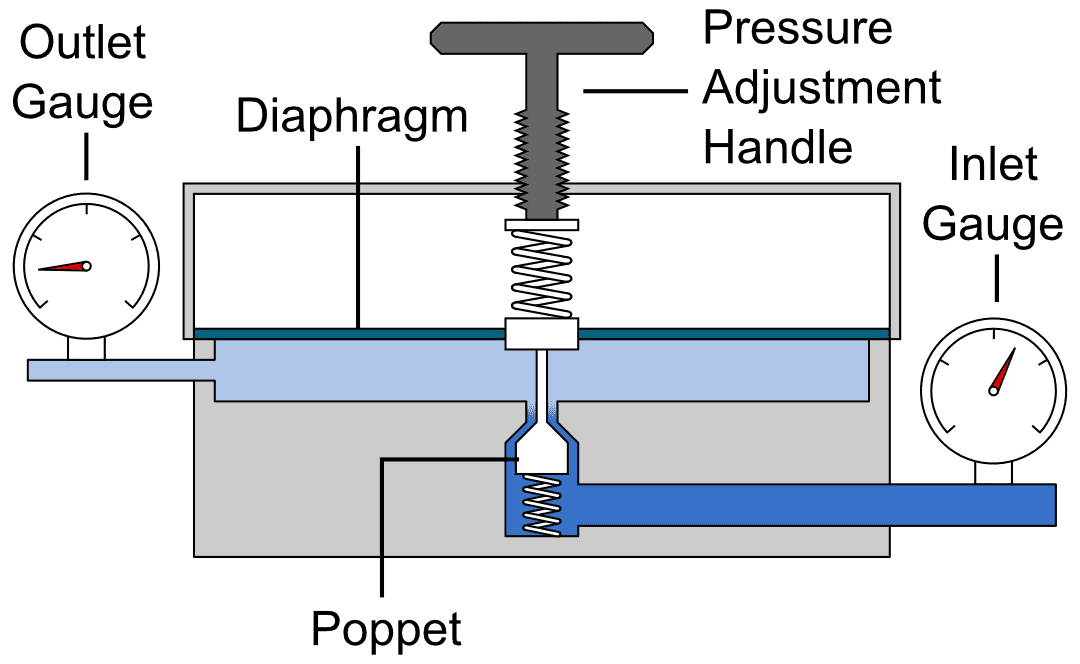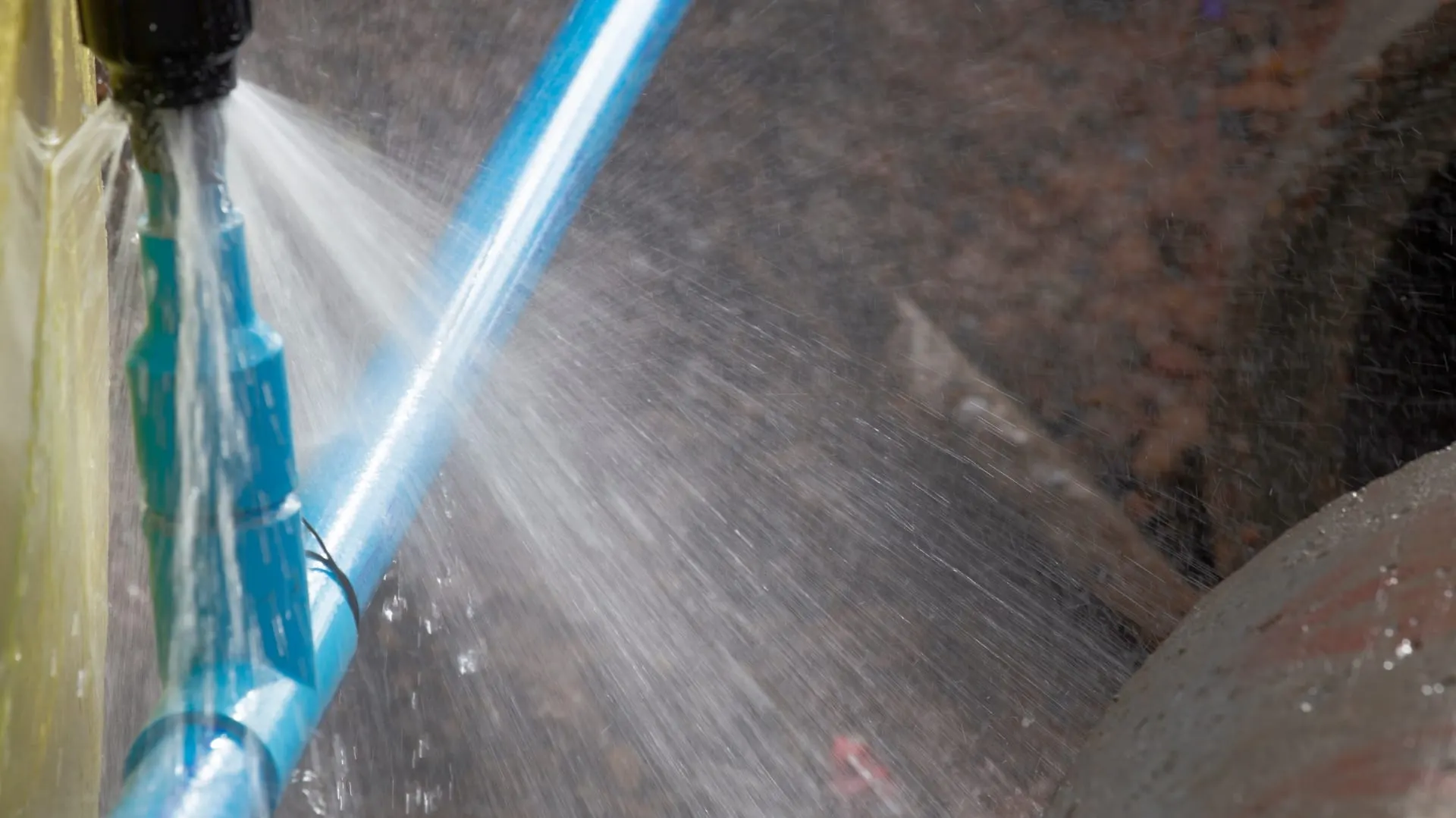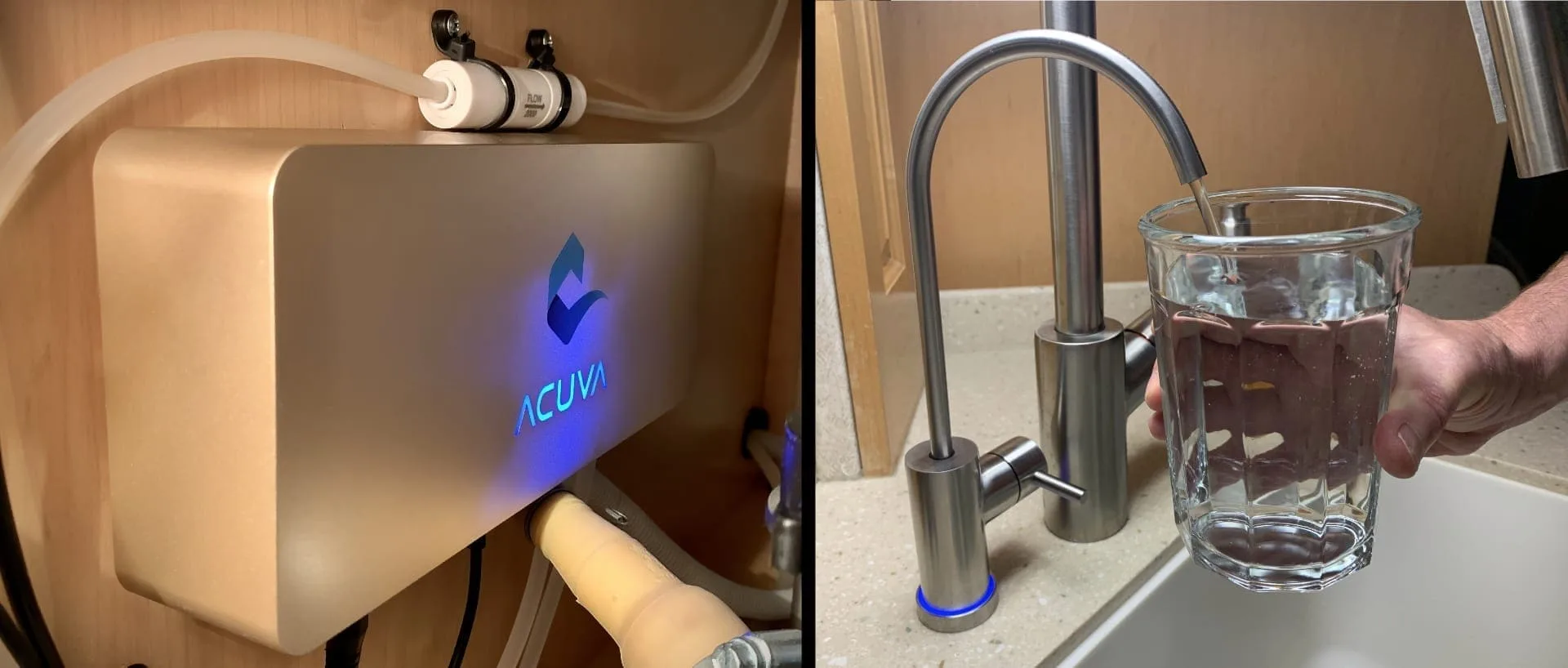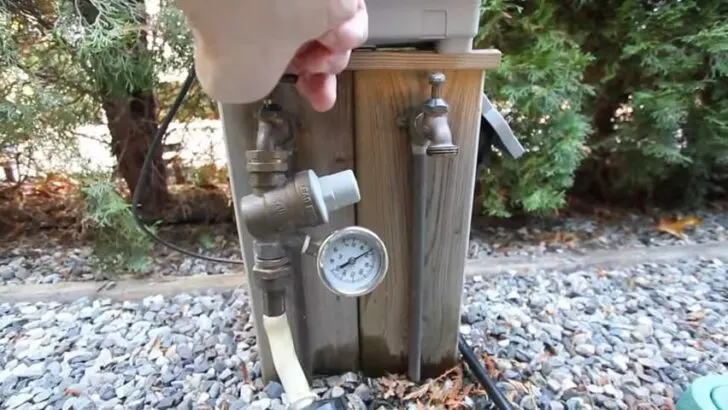We recently posted an article about how to connect your RV to full hookups to give new RVers a boost of confidence as they set out on the marvelous journey of RV travel, as we did 18 years ago. Among the items we mentioned as necessary to have onboard your RV is a water pressure regulator.
There’s no getting around this one, and there’s no excuse to not carry it. They’re inexpensive, readily available, small, lightweight, and absolutely essential. In today’s post, we’ll tell you why.
- 1) What is an RV Water Pressure Regulator?
- 2) How Does an RV Water Pressure Regulator Work?
- 3) Does My RV Need a Water Pressure Regulator?
- 4) Do RV Water Pressure Regulators Go Bad?
- 5) Adjustable vs. Non-Adjustable Water Pressure Regulators
- 6) New Acuva ArrowMAX 2.0 + Discount!
- 7) Conclusion About RV Water Pressure Regulators
What is an RV Water Pressure Regulator?
An RV water pressure regulator is a valve that connects to a water source to control the pressure of the water entering your RV’s plumbing system from the city water connections in campgrounds and RV parks. Here’s a basic version that’s very commonly used:
- PROTECTS RV/MARINE PLUMBING: Keep your RV/marine plumbing safe with this brass Camco water pressure regulator. Safeguard against high-pressure city...
- AUTOMATIC PIPE BURST PROTECTION: Ensure your pipes are safe using the built-in PSI Guard, preset at 40-50 PSI for automatic burst protection. (Maximum...
One end of the regulator screws onto the spigot of your water source, and the other end connects to your water hose. Its purpose is to prevent excessive water pressure from damaging your RV’s plumbing system.
How Does an RV Water Pressure Regulator Work?

The inner workings of a single-stage, adjustable water pressure regulator (Wikipedia)
A water pressure regulator has a spring-loaded diaphragm designed to control the size of the outlet opening. The greater the inlet pressure is hitting that diaphragm, the smaller the outlet opening is, thus controlling the pressure on the outlet side. All of this is designed to regulate the amount of pressure in your RV’s plumbing system, reducing it to safe levels, protecting your RV’s plumbing and your RV itself from potentially costly water damage.
Does My RV Need a Water Pressure Regulator?
In a word, yes.
RV plumbing can’t sustain the kind of water pressure that enters a building, because the plumbing in an RV is less robust and not designed for high-pressure water delivery. Municipal water systems, for example, can deliver water pressure as high as 150-200 psi. By contrast, most RV plumbing specialists recommend that the water pressure supplied to an RV not exceed 60 psi, with a comfortable recommended pressure of around 40-50 psi.

Without a water pressure regulator, your RV’s plumbing could spring a leak!
Without a pressure regulator as protection, excessive water pressure may be allowed to run into your RV’s plumbing system, risking damage to seals, fittings, and the plastic “PEX” pipes running throughout your RV.
The bottom line? No matter where you hook up your RV, you can’t be completely certain of the water pressure UNLESS you use a water pressure regulator.
It only takes one bad experience with the consequence of exploded plumbing and a flooded RV to make crystal clear the absolute necessity of this essential item.
Do RV Water Pressure Regulators Go Bad?
It’s possible for your regulator to degrade or stop working after substantial time and use. If you find yourself with low water pressure or none at all, (particularly if you’ve used the same source previously without issues), your regulator may be the culprit.
When faced with low or no water pressure, first check for other common issues such as a kinked hose (unless, of course, you have a kink-free fresh water hose) or plugged water filter. If you don’t find a kink in your hose and you’ve removed or replaced your inline water filter, it may be time to replace your pressure regulator. Many RVers even carry an extra one, a reasonable idea given the affordability of basic regulators at less than $10.
If you’ve identified the regulator as the culprit for your low flow, but don’t have a spare on hand, we’d suggest making sure your fresh water tank is full and run off of that using your onboard water pump. DON’T just disconnect your bad regulator and hook straight up to the city water supply, as you could risk damaging your RV’s plumbing system. By running off the onboard water using your pump until you have a new regulator inline, you’ll avoid that danger.
Adjustable vs. Non-Adjustable Water Pressure Regulators
Depending on the pressure your rig’s plumbing requires, you may find it worth investing in an adjustable water pressure regulator. They cost more but come with a gauge to show you the pressure your RV’s plumbing system is being exposed to and have an adjustment screw that you can tighten or loosen, thereby lowering or raising the allowed water pressure. This is our favorite model.
- WATER REGULATOR: Versatile water regulator is compatible with standard campers, RV's, trailers, and more
- IDEAL PRESSURE: Regulates water pressure to your preference with pressure gauge
Adjustable water pressure regulators tend to offer high flow rates for the same outlet pressure. This can be important when more than one faucet/tap is open at a time in the RV. A higher flow rate will allow more water through, so you won’t see reduced flow at one faucet when another is turned on, or at least the reduction in flow will be minimized.
Non-adjustable models are generally available in low-flow or high-flow models only, so double-check that the default pressure will work for you and your RV before purchasing one.
Regardless of which water pressure regulator you buy, be sure that it is a lead-free model since all the water entering your RV will pass through it, including your drinking water. Do NOT use one designed strictly for garden use, as that may contain some level of lead.
New Acuva ArrowMAX 2.0 + Discount!
While we’re on the topic of fresh water, we’ve installed Acuva’s newest water purification system in our RV — the ArrowMAX 2.0. It offers the safety of Acuva’s renowned UV-LED purification, ensuring that our water is safe to drink, even from our fresh water tank.

The ArrowMAX 2.0 is flow-triggered, so it can be used with any countertop drinking water faucet/dispenser. You can also order it with Acuva’s “Smart Faucet” that has the ring of blue LED light to show you that it’s active. The ArrowMAX 2.0 is NSF/ANSI 55 Class ‘B’ and NSF/ANSI 372 certified and delivers up to 2 liters/minute.
Ditch the bottled water! Major cities sanitize their drinking water using ultraviolet light, and now you can, too. Acuva’s UV-LED system makes water safe to drink, using a fraction of the space...Show More
Ditch the bottled water! Major cities sanitize their drinking water using ultraviolet light, and now you can, too. Acuva’s UV-LED system makes water safe to drink, using a fraction of the space and power… perfect for RVs.
Check out our Acuva installation video here
Get 10% off any Acuva system when shopping online at Acuva's website and using the discount code listed here.
Show LessCurious about the Acuva system, but want to know more? Check out our videos about it:
Acuva Install
We Test Acuva
Conclusion About RV Water Pressure Regulators
We don’t like to use absolutes, so we generally try to avoid them. But in the case of a water pressure regulator, we not only strongly recommend using one, but we’re also comfortable stating that you absolutely need one for connecting your RV to an external water source.
A water leak is the bane of any RVer’s existence. Even a slow leak from a damaged plumbing seal can cause a real headache. But when you consider the amount of damage that could occur as the result of a burst PEX pipe or fitting, perhaps even when you’re away from your RV (you know that’s when it’s going to happen, right?!), it’s easy to understand the value of spending about ten dollars to purchase even the most basic water pressure regulator.
If you don’t already have one and you intend to connect your RV to a water source, buy one today.
Geek Out with Us Every Week
Join our newsletter to learn about all things RV-related. Every week we offer free tips, tricks, product reviews, and more to our online community of RVers. Whether this is your first time on the road or you’re a seasoned expert, we’d love for you to geek out with us!





Brigitte
Friday 10th of November 2023
Hi I am a newbie and would appreciate your feedback. I hooked up my RV to my home's water source. I was surprised to notice it cracked both actual valves of the non-freeze water taps. Does this mean I need a regulator from my home to the RV? I was so thankful it didn't create damage to the RV lines.
Brigitte
Tuesday 16th of January 2024
@TheRVgeeks, just realized you replied! Thank you so much. As far as I know there wasn't damage to my RV. Would you recommend the Valterra RV Water Regulator, Adjustable Water Regulator with Pressure Gauge? (ie. Is the one with the guage better?)
TheRVgeeks
Friday 10th of November 2023
Hi Brigitte! We strongly recommend that you never ever connect your RV plumbing system to any source of pressurized water without using a pressure regulator. It should be standard operating procedure, regardless of where you’re hooked up, as it’s cheap insurance against potential major damage. We hope your RV is OK. If you’re not seeing any water leaking, you haven’t likely done any damage. But we would get a water pressure regulator right away and use it 100% of the time.
Konni
Wednesday 15th of March 2023
I am currently living in a 30 foot trailer. I have a smell that comes out of the toilet and it’s there even after flushing it and cleaning it and putting the additives in it. My regulator was off for a while, and the smell stopped but we put the regulator back on and the smell is back. Do you have any suggestions on how to handle this with the lack of water pressure?
TheRVgeeks
Sunday 19th of March 2023
Hi Konni... not sure what connection there could be between using a pressure regulator on your water supply and getting an odor from your toilet. Could just be a coincidence. If you're getting a bad odor from your black tank, you may need to soak the tank with a heavy treatment of something like Happy Campers (or the Happy Campers Extreme), which may help to break down any "gunk" left stuck on the sides of the black tank.
Peter Dube
Thursday 1st of July 2021
Thanks guys, good insight. My husband and I are picking up our new diesel pusher next week (finally!) that we ordered in February. I have owned many rvs but this is my first coach with Girard tankless water heater and I have read some online forum posts that they require higher pressure. Do you have any thoughts?
TheRVgeeks
Friday 2nd of July 2021
Hi Peter! First off, congratulations on your new rig! You guys must be so excited, and we're excited for you! We weren't familiar with the Girard unit, so we looked up some specs and details. The instant/tankless/on-demand water heater brand we're most familiar with is Truma, since our friends Tom & Cait have had two of them in different rigs.
Girard says that the flow should be at least 0.8 gallons per minute to trigger the heating process. With our pressure regulator in place at a full hook-up, we just did a test to see what our flow rate is. With a stopwatch and a pitcher marked at exactly 1-gallon, we clocked exactly 55 seconds to fill the pitcher with the faucet wide open, and our regulator set to a pretty typical flow, as usual. So we're exceeding the 0.8 gallons/minute by a safe margin, and the flow when we're on the water pump is even higher than that. So you should be fine, as long as you're not too worried about having to run water on higher flow than typically used for boondocking.
That's always been the thing that's given us pause when we've talked about switching to tankless: boondocking. The need to run a certain flow to get it to heat up, when we're in super water-saving mode. Tom & Cait boondock a lot, and they swear they have nice hot showers. But their Truma activates the heat on only 0.4 gallons/minute. We haven't switched to a Truma because we're REALLY serious boondockers, and have measured our rate of flow when showering at only about 0.3 gallons/minute.... a veritable trickle. We're not sure ANY tankless heater would work for us.
But if you're not planning long trips off-grid, where ultimate water conservation is required, the pressure regulator shouldn't cause you any problems at all. To be 100% sure, you should consider the one we use, since the flow rate is good, and the pressure can be adjusted: https://amzn.to/3yhcQ1p
Bill
Thursday 1st of July 2021
My husband and I are newbie RV'ers in our Class A. Thank you so much for your valuable insights and experiences. I find your posts informative and educational that help us along our way. Keep up the great work. BTW, your favorite regulator is the same one we purchased. Good to know now. ;-)
TheRVgeeks
Thursday 1st of July 2021
Thanks so much for your kind words, Bill, and congratulations on your new rig! You got the best regulator by the way! ????
Pat Parker
Wednesday 30th of June 2021
Great information for all not just newbies. Thanks you two for all you do
TheRVgeeks
Wednesday 30th of June 2021
Thanks so much, Pat! ????